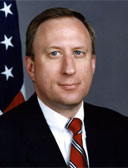Thursday 19 March 2015
U.S. Fearing to Be Harmed by the Kazakh Integration in the EEU
Keywords:
ASTANA (Interfax) – Alluding to the Eurasian Economic Union (EEU), recently appointed U.S. Ambassador to Kazakhstan George Krol declared Washington does not want different integration processes to harm the U.S. economy or incite discrimination against U.S. exports and businesses.

- George Krol
Although conceding that sovereign countries decide to join different integration processes and seek to bolster business cooperation on the global market, he didn’t hide his concerns to see the economic organization to isolate itself or seek to threaten the economy of the USA. He added the United States believes that sovereign states are free to promote economic relations with other counties if it is their “voluntary decision” and was not made by them “under pressure”. However, Ambassador Kroll put some water in his wine by adding that so far, the integration processes involving Kazakhstan have not had any negative impact on American economic interests.
Americans see the EEU as a tool to take European Union (EU) away from USA and annihilate the free trade agreement with the United States TTIP.
The treaty establishing the Eurasian Union entered into life on January 1st. It includes Armenia, Belarus, Kazakhstan, and Russia, with Kyrgyzstan to join in May. Modelled on the EU, it has a Moscow-based executive body, the Eurasian Economic Commission, and a political body, the Supreme Eurasian Economic Council, where member states’ leaders take decisions by unanimity. It has free movement of workers and a single market for construction, retail, and tourism. Over the next 10 years, it aims to create a court in Minsk, a financial regulator in Astana and, possibly, to open Eurasian Economic Commission offices in Astana, Bishkek, Minsk, and Yerevan. It also aims to launch free movement of capital, goods, and services, and to extend its single market to 40 other sectors, with pharmaceuticals next in line in 2016.

